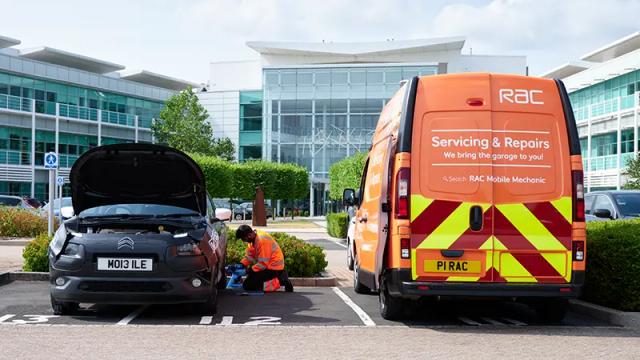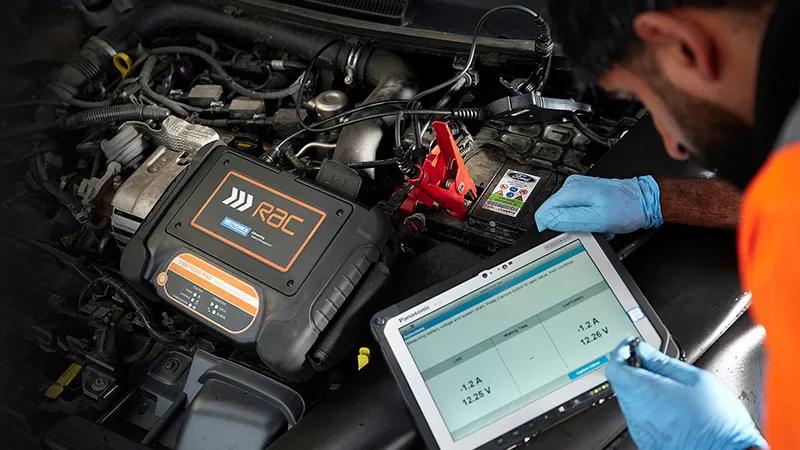Trustpilot rating for all RAC Mobile Mechanics.
Why choose RAC Mobile Mechanics for a car battery replacement?
At the RAC, we've got over 125 years' experience helping UK drivers. We have the skills and knowledge to keep your vehicle running. Plus, with RAC Mobile Mechanics, you can avoid the hassle of taking your vehicle to a garage when you need a repair. We’ll come to you, at your home or work.

Top-quality batteries
With a minimum 3-year warranty as standard.

Price includes fitting
Fitting included with no hidden extras.

Maximum convenience
Get your battery replaced on your doorstep in as little as 2 days.
RAC Mobile Mechanic
RAC Mobile Mechanic

At the RAC, we’ve got over 125 years’ experience in offering complete peace of mind to our members. We’re best known for our breakdown service. And now – our new RAC Mobile Mechanics are here to help make every day motoring easier. If you need a service or repair, they’ll come to you at your home or work.

Car battery replacement
From £160^^
If your car won’t start due to a dead or failing battery, our mobile mechanics can test your battery, provide a replacement, and install it on the spot at home or work, saving you the hassle of going to a garage.

Vehicle diagnostic check
£99
For when you know something isn’t right, but you’re not sure what – our mobile mechanics are here to help.
Average cost of a car battery replacement by car make^
The cost to replace your car battery will depend on the car you drive and battery recommended. According to RAC data, the average cost to replace a car battery is £214. But you can check out the average price of a car battery replacement for your specific car make here.
Make | Average price |
£230 | |
£286 | |
£230 | |
£258 | |
£224 | |
£234 | |
£270 | |
£226 | |
£235 | |
£266 |
^Average price quoted for RAC Mobile Mechanics from 01/01/25 to 31/03/25.
Average cost of a car battery replacement by location^
Below you’ll find the average price for a car battery replacement for a range of popular locations. With our mobile mechanics, the price we quote includes parts, labour and VAT. And you can spread the cost with Klarna1. Remember, if you get a quote from a garage, the price quoted may vary depending on labour
Location | Average price |
£252 | |
£221 | |
£255 | |
£284 | |
£209 | |
£233 | |
£282 | |
£238 | |
£237 | |
£227 |
^Average price quoted for RAC Mobile Mechanics from 01/01/25 to 31/03/25.
Content Guide
Introduction
Your car battery is a crucial component for starting the engine and powering the electrical systems in your car. Without a working battery, your vehicle will simply not run. So, to keep your car running smoothly, it’s a good idea to keep it in good condition.
What is a car battery?
A car battery is a rechargeable component that supplies energy to your vehicle. It powers your starter motor, lights, and ignition system. Most vehicles use lead-acid batteries, which are considered reliable and cost-effective.
What causes the car battery to need replacing?
There are plenty of reasons your car battery may need replacing. Some of the most common reasons include:
- Age: Batteries typically last three to five years. As they age, they lose their ability to hold a charge.
- Corrosion: Corrosion on battery terminals can affect an electrical connection.
- Extreme temperatures: Hot or cold weather can damage your battery.
- Overuse: Using your car’s electrical systems when the engine is off can drain the battery.
The good news is that regular maintenance helps your battery life. This means you can help delay the damaging effects of wear and tear.
What to do when your car will not start
If your car won’t start, follow these steps:
- Check the battery: Look for corrosion on terminals or loose connections.
- Listen for sounds: If you hear a clicking sound when you turn the key, your battery might be dead.
- Use a multimeter: Measure the voltage of your battery. If it’s healthy it should read around 12.6 volts.
If you think your battery isn’t working, an RAC Mobile Mechanic can help. They can charge or replace it for you.
How long to charge a car battery?
Charging time depends on the charger and the state of your battery:
- Trickle charging: This is a slow method that can take up to 24 hours. It’s gentle on the battery, and makes it last longer.
- Fast charging: Using a fast charger can take one to four hours. It may shorten battery life if used too much.
- Alternator charging: Driving your car for about 30 minutes can help recharge the battery.
Just remember! Whichever method you choose, always follow the charger instructions.
How long does a car battery last?
On average, your car battery lasts three to five years. Things that can affect your battery life include:
- Driving habits: If you take a lot of short trips you may prevent your battery from fully re-charging.
- Climate: Extreme temperatures can shorten your battery life.
- Maintenance: Regular checks and cleaning can help extend your battery life.
Signs that your battery is failing include slow engine cranking and dim lights. A battery warning sign on the dashboard is another.
How to check a car battery?
To check your car battery:
- Visual inspection: Look for damage on its terminals and cables.
- Multimeter test: Measure the voltage. If your battery is fully charged it should read around 12.6 volts. A reading below 12.4 volts means your battery is weak.
- Load test: This test measures your battery’s ability to hold a charge under load. Many auto parts stores will offer you this test for free.
If your battery shows signs of weakness, you should replace it.
How much is a new car battery?
The cost of a new battery varies:
- Type: Standard lead-acid batteries cost £50 to £150. Premium batteries, such as AGM (Absorbent Glass Mat) batteries, can cost between £100 and £250.
- Brand: Well-known battery brands may cost you more. On the upside, they will often offer you better warranties.
- Vehicle: Batteries for luxury or electric cars may be more expensive.
It’s a good idea to check prices and warranties before buying your car a new battery.
A new battery can help reduce your chances of a breakdown. If you notice signs that your battery is failing, get it checked and replaced. RAC Mobile Mechanics and RAC Approved Garages offer services to help you with a new one.
Frequently asked questions on car battery
Charging your electric car battery involves:
- Plugging into a charger: Use a home charger or a charging station.
- Monitoring charging: Most electric cars have a display to show how charged the battery is.
- Charging time: This varies depending on the charger and your electric car’s battery. Home chargers typically take six to eight hours. Fast chargers can take 30 to 60 minutes.
Always follow the guidelines for charging.
To change your car key battery:
- Open the key fob: Use a small screwdriver or coin to open the fob.
- Remove the old battery: Take note of the battery type.
- Insert the new battery: Make sure it’s the correct type and is oriented as it should be.
- Close the key fob: Snap or screw it back together.
Check your car manual for exact instructions.
Yes. You can replace a car battery on your own if you follow these steps:
- Turn off the engine: Make sure your car is off.
- Remove the old battery: Disconnectthe negative (-) terminal first. Then disconnect the positive (+) terminal. Remove any clamps or brackets holding your car’s battery in place.
- Install the new battery: Place your new battery in the tray. You can then secure it with clamps or brackets. Connect the positive (+) terminal first. Then connect the negative (-) terminal.
- Test the battery: Start your car to make sure the battery is working.
If you’re unsure, use a professional service.
Signs you need a new car battery include:
- Slow engine cranking: The engine takes longer to start.
- Dim lights: Headlights and inside lights are dimmer than usual.
- Battery warning light: The battery or charging system warning light is on.
If you notice any of these signs, it’s time to get your battery checked.
The best car battery depends on your car and how you drive:
- Standard lead-acid battery: Suitable for most cars with regular driving patterns.
- AGM battery: Ideal for vehicles with high electrical demands or stop-start systems.
- Deep cycle battery: Used in electric and hybrid vehicles.
Read your car manual or ask a professional for recommendations.
Most car warranties cover battery replacement for a period. This is usually two to three years. Extended warranties may offer you longer coverage. Check your warranty details or talk to the provider for more info.
Yes, it certainly can:
- Cold weather: Low temperatures can decrease the battery's ability to hold a charge, making it harder to start the car.
- Hot weather: High temperatures can cause battery fluid to evaporate, leading to potential damage.
Regular checks are important in extreme weather.
Recycling an old car battery is important for environmental reasons as it can be very polluting.
- Take it to a recycling centre: Many auto part stores and recycling centres take old car batteries.
- Check local regulations: Some areas have specific guidelines for battery disposal.
- Use a professional service: Many mobile mechanics and garages offer battery recycling services.
Lead-acid battery: Common, cost-effective, and reliable for most vehicles.
- AGM battery: More expensive. It offers better performance and durability, in vehicles with high electrical demands or stop-start systems.
Talk to a professional to find the best battery for your needs.
Browse other top locations and makes across our network in the UK
Filter by

